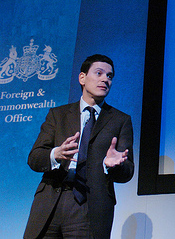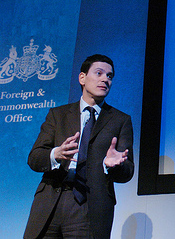David Miliband as EU Foreign Minister (or not?)

 Welt am Sonntag reported yesterday that David Miliband might be a candidate for the EU Foreign Minister High Representative of the Union for Foreign Affairs and Security Policy, the foreign affairs position created by the Treaty of Lisbon. A FCO spokesperson has made a very bland statement that Miliband is working on his current tasks as UK Foreign Minister and does not have his eye on something at EU level. The article in Welt am Sonntag also speculates that there is some sort of new package deal – that the UK could live with Jean Claude Juncker as President of the European Council if Miliband took the Foreign Affairs role.
Welt am Sonntag reported yesterday that David Miliband might be a candidate for the EU Foreign Minister High Representative of the Union for Foreign Affairs and Security Policy, the foreign affairs position created by the Treaty of Lisbon. A FCO spokesperson has made a very bland statement that Miliband is working on his current tasks as UK Foreign Minister and does not have his eye on something at EU level. The article in Welt am Sonntag also speculates that there is some sort of new package deal – that the UK could live with Jean Claude Juncker as President of the European Council if Miliband took the Foreign Affairs role.
So is all of this likely, and is it desirable?
First of all I would be very happy for Miliband to take up some role in the EU. He’s a clever, communicative, coherent, intelligent and pro-European politician. He takes the EU seriously, and as far as I can tell he’s the only current UK cabinet minister that’s reasonably well regarded in Brussels. Having said that taking Miliband out of UK politics for 5 years or more would be seriously damaging for Labour and for his own career – after all Miliband is 42 now and is widely tipped to be a candidate for Labour leader once Brown quits or loses a general election. In the short term rumours of a Miliband exit would further damage a rather weak Brown cabinet, within which Miliband is one of the few stars.
Which leads me to the issue of whether Miliband as EU Foreign Minister is likely… When it comes to EU institutional logic then it looks like a sensible deal – Juncker would be European Council President, presumably with Barroso going for a further term as Commission President, and then a younger person from the left and from a larger EU Member State (Miliband) as EU Foreign Minister. But set against the background of UK politics and the Brown government’s present problems, and Miliband’s age and stage of his career, I reckon it’s still highly unlikely.
[UPDATE 23.10.09]
It’s still far from being a reality, but it seems there’s a little more to Miliband’s candidacy now, especially as Blair’s stock seems to have waned a little. See today’s Guardian, and this good analysis from the Economist’s Charlemagne blog.
Let me add a snippet of information in the EU top post speculation bubble.
At yesterdays Fabian Conference “The Global Change we Need” in London,
David Miliband and Poul Nyrup Rasmussen spent a significant amount of time talking to each other away from the conference floor. It would surprise me if they had not discussed the upcoming decisions on EU top posts in general and the role of High Representative in particular.
I think Miliband would be an excellent choice. Nor do I think it will harm his career. Quite the opposite. Five years will enhance his reputation and stature. He could return to British politics at a by-election. A two term Cameron government takes us to 2018.
Miliband should grasp the opportunity. He would craft European Foreign, Defence and Security for a generation to come. He leads on climate change, G20, nuclear disarmament and arctic warming for the EU. He is a consensus builder. He is what Europe needs in that post.
Five years as High Representative of Europe or 8 years as shadow leader?
Agree – it is unlikely.
While it must be obvious to Miliband more than any other that the Foreign Office is – like the offices of Agriculture and Trade of the past – on the slow and steady path to redundancy within the ever-centralising EU-state construct, I expect what he wants above all is the top job.
But what confuses me about many of our so-called leaders who favour greater political integration within the EU is how they can still aspire to such office when, as a direct consequence of their EU-enthusiasm, those offices are increasingly devoid of power.
What does such apparent ‘ambition’ for mere symbolism, rather than the ability to lead and bring about real change in line with a distinct vision, say about the quality of today’s political leaders?
Certainly the situation may well explain why there’s increasing public dissatisfaction with our democratic system. The danger of which, for stability and prosperity, should never be underestimated.
Jon, I concur with your analysis. I would be surprised to see Miliband leaving British politics for 5 years, when there will be UK general elections in one or two years. He could also take the post and resign at the appropriate moment, but it wouldn’t look good on him; and besides it surely must be very difficult to do party politics from Brussels.